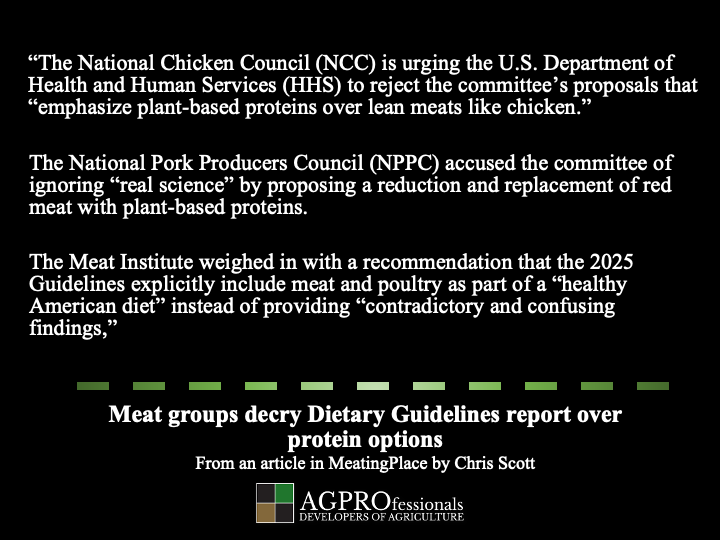Major meat industry organizations are blasting the latest 2025 Dietary Guidelines Advisory Committee’s Scientific Report over what they contend are unscientific and confusing recommendations for the diets of U.S. citizens.
The National Chicken Council (NCC) is urging the U.S. Department of Health and Human Services (HHS) to reject the committee’s proposals that “emphasize plant-based proteins over lean meats like chicken.” The latest report released last fall focused on eating beans, peas and lentils as an optimal protein source above chicken and failed to mention that lean meat can be part of a healthy dietary protocol, implying falsely that plant proteins are “nutritionally superior to chicken,” the NCC said in a news release.
The National Pork Producers Council (NPPC) accused the committee of ignoring “real science” by proposing a reduction and replacement of red meat with plant-based proteins. The industry organization contends that such proposals place infants, young children, adolescent girls, pregnant and lactating women and older adults at risk because those groups require higher levels of the protein and nutrients provided by animal-based proteins, NPPC said in a release. “The health of our nation is at risk as these guidelines inform all federal nutrition programs, including those affecting our schoolchildren and the military (in addition to) health professionals,” said Rod Brenneman, NPPC vice president and a pork producer in Washington, Iowa.
The Meat Institute weighed in with a recommendation that the 2025 Guidelines explicitly include meat and poultry as part of a “healthy American diet” instead of providing “contradictory and confusing findings,” the organization noted in a news release. “When Americans eat meat, it is important to provide clear dietary guidance to consumers on how they can include meat products they love in their diets and also produce a positive, measurable health impact,” a Meat Institute official said in the statement.
The final version of the 2025 Dietary Guidelines recommendation covering the next five years is expected to be formally finalized and released later this year.

